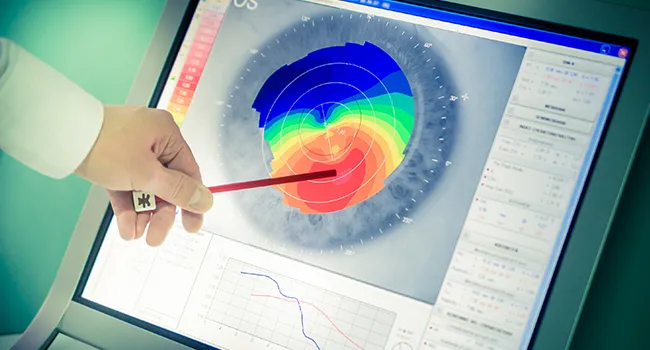Things to expect before, during, and after corneal transplant surgery
Before knowing what corneal transplant surgery is and everything that it entails, let’s begin by understanding the cornea.
What is the cornea?
The cornea is the clear, transparent protective outer layer of the eye. It covers pupil, iris, and anterior chamber. When light enters your eye, it gets refracted by the cornea’s dome-shaped, curved edge. It plays a vital role in vision as it helps in determining how well your eyes can focus on near and far away objects.
If the cornea gets damaged by some disease, injury, or infection, the scars can disrupt your vision. Therefore, any issue related to cornea should be dealt with promptly.
What is cornea transplant surgery or Keratoplasty?
A cornea transplant is a surgical procedure that involves replacing a diseased or scarred part of your cornea with a donor’s healthy corneal tissue. Corneal transplant surgery is done on an outpatient basis and is mostly successful.
Corneal transplant surgery is done to restore the patient’s vision, relieve pain, and improve the cornea’s overall appearance.
Why is corneal transplant surgery done?
There are several eye conditions that indicate that you may need corneal transplant surgery, like:
- Keratoconus
- Thinning of the cornea
- Swelling, clouding of the cornea
- Fuchs’ dystrophy
- Corneal scarring
- Previous eye surgery complications
What are the risks associated with corneal transplant surgery?
Though corneal transplant surgery is a safe procedure, there are risks associated with any surgery.
Hence, the complications associated with the cornea transplant are:
- Increase in pressure within the eyeball
- Rejection of the donor’s cornea
- Eye infection
- Swelling in the cornea
- Blurred vision due to risk of clouding of the lens of the eyes
What to expect before a corneal transplant surgery?
There are several things you can expect to undergo before a corneal transplant surgery:
- Comprehensive eye exam:
An overall eye checkup helps the doctor in assessing the current condition of your eyes. The doctor will also determine what size of the donor cornea you need.
- Discussion of the medications you are taking:
It is imperative for your doctor to know what medications and supplements you are taking. You can be asked to stop taking them before or after cornea transplant surgery.
What happens during a corneal transplant?
On the day of your surgery, your eyes will be put to local anaesthesia to numb your eyes. You will also be given a sedative to relax.
In some cases, the surgeon removes abnormal or diseased cornea and replaces it with a healthy matching portion of the donor’s cornea.
Sometimes, the surgeon removes a thin layer of cells from the front part of the cornea, replaces it with a donor’s tissue by stitching. While in some cases, the damaged inner layer of the cornea is removed and is replaced by the donor’s tissue. An air bubble is used to push this new layer into the eyes so that the cornea heals properly.
What happens after a corneal transplant?
After your corneal transplant surgery, you can expect:
- Medications:
Your surgeon will prescribe you with certain medications like eye drops, oral medicines to control swelling, pain, and infection.
- Eye patch:
You can be expected to wear an eye patch to protect your eyes after the surgery.
- Get into healthy routine life slowly:
Take it easy when it comes to getting back into your routine life. Take all necessary precautions to avoid further infections, injuries, or eye strain.
- Follow up exams:
You might expect to get back to your doctor for frequent eye check-ups, at least for the first year after the surgery.
Things to keep in mind post the surgery:
- Do not rub your eyes
- If you have a job that requires manual labour, then take 4-5 months of rest before getting back
- Avoid strenuous exercise, heavy lifting
- Avoid dusty and smoky places as such environments can increase irritation in your eyes
- Wear sunglasses while stepping out in the sun
- Get back to driving, only when your doctor suggests
- Avoid swimming and contact sports for at least a month. Avoid getting water into your eyes
Centre for Sight has expert surgeons who manage many complex corneal cases daily. All our specialists have been dealing with these corneal diseases for several years and have helped the patients regain a healthy vision. Be it corneal transplant surgery or Lasik surgery,we provide treatment for many eye ailments. Visit us for the best possible eye care.
Article: Corneal Transplant Surgery: Things to Expect Before, During, and After
Author: CFS Editorial Team | July 15 2020 | UPDATED 1:25 IST
*The views expressed here are solely those of the author in his private capacity and do not in any way represent the views of Centre for Sight.







